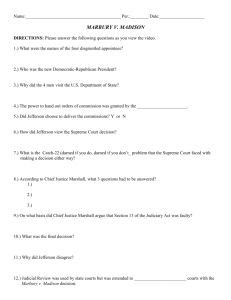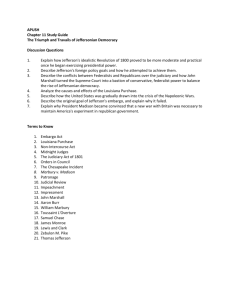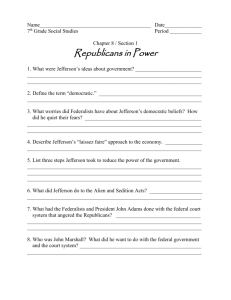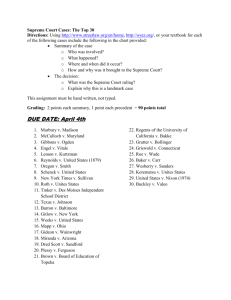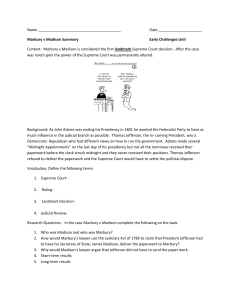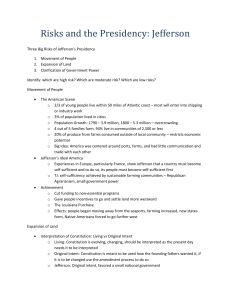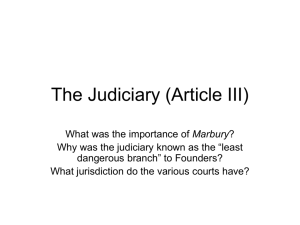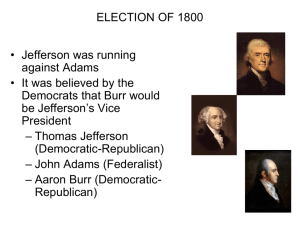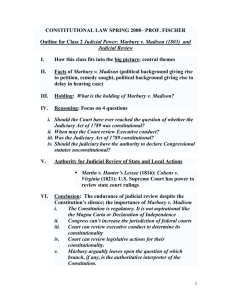The Era of Jefferson
advertisement
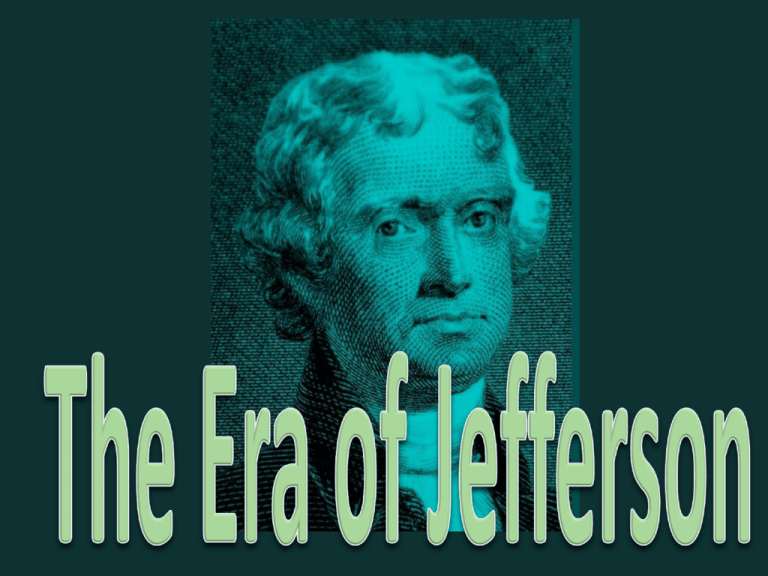
• I will… – Explain the “deal” brokered to allow Jefferson to become the 3rd US President – Explain the changes to the federal government implemented by Jefferson during his presidency – Interpret and analyze the significance of the Supreme Court Case of Marbury vs. Madison • Results – – – – – Thomas Jefferson – 73 Aaron Burr – 73 John Adams – 65 Charles Pinckney – 64 John Jay – 1 • House of Representatives votes for Jefferson – 6 days, 36 different votes • Jefferson wins..How? • Results in the – Electors would vote separately for President and Vice-President • Alexander Hamilton brokered the deal for T.J. to win the presidency… – Why? NOT because he like T.J., but because he couldn’t stand Aaron Burr • Leaves Aaron Burr really stoked • July 1804, Aaron Burr kills Alexander Hamilton in a duel…yep, a duel! You can tell I’m Aaron Burr by the way I’m dropping Hamilton's • Federalists ceded power to Democratic Republicans peacefully Wars typically errupted in Europe caused from exchange of power • Jefferson brought major change to the federal government Limited the powers of federal government of states and citizens and… • Literally translates to : “Leave Alone!” • Government should stay out of economic affairs • Very similar to today’s Republicans – Spending on social programs = – Government aid to corporations = – Government regulations on businesses = 1. Reduced the number of people actually working in the government – Fired tax collectors, cut the number of US diplomats overseas 2. Eliminated all federal taxes – Included the Whiskey Tax – All government funding comes from tariffs 3. Reduced the size of the navy and army – Army = 4,000 to 2,500 4. Pardoned those prosecuted under the Sedition Act • Kept the National Bank of the US • Continued paying down the national debt • Retained most Federalist officeholders Haters gonna hate...but I know the meaning of throwing the opposition a bone! • Election of 1800 – Republicans take the Executive and Legislative branches – Federalists still control the Judicial branch – Adams passed a bill allowing him to “pack the court” with Federalists • Appoints 16 federal circuit judges and 42 justices of the peace in his last month of office • William Marbury (“midnight judge”) appointed justice of the peace for Washington D.C. the night before Adam’s leaves office • The practice of making such appointments was to deliver a "commission," or notice, of appointment – Secretary of State, James Madison refuses • William Marbury sues Madison under the Judiciary Act of 1789 If theInSupreme Both Scenarios… Court rules… • “Yep, Marbury should be placed in his commission and T. Jeff doesn’t actually do what we say (which would’ve prolly happened), we would look weak.” • “Nope, Marbury doesn’t have the right to the commission, then the we look like pansies…like we’re afraid of T. Jeff.” – What to do?!? • Spelled out the practice of delivering commissions for judges and justices of the peace • Also discussed something called a writ of mandamus (“we command”) , which basically says that the Supreme Court could hear cases for the “first time” (original jurisdiction) • The Constitution says the Supreme Court DOES NOT have that right to do that! – Supreme Court only has appellate jurisdiction • Trial Courts – Courts with original jurisdiction have the power to hear a case for the first time – Evidence, testimony, witnesses…Law & Order • Appellate Courts – Only review decisions and change outcomes of decisions of lower courts – No witnesses, no testimony, just a review of the facts Article III, Section 2 of the Constitution: The Supreme Court only has appellate jurisdiction…So, the Judiciary Act of 1789 is unconstitutional! (or at lease the writ of mandamus) • Court rendered a unanimous (4–0) decision – Marbury had the right to his commission but the court did not have the power to force Madison to deliver the commission • Instead ruled the Judiciary Act of 1789 unconstitutional • Establishes the principle of Judicial Review – Legislative and executive actions are subject to review (and possible invalidation) by the judiciary • Longest serving Chief Justice in the country’s history (34 years) • Before J.M. the judiciary was the weakest branch of the government • After J.M. it was an equal player – Marbury vs. Madison establishes the right for the courts to say a law is NOT in alignment with the Constitution…a safeguard in the system of “checks and balances”! You’ve just been “lawyered”…. Boo-ya!
